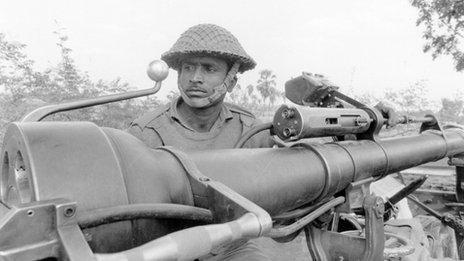Bangladesh MP Salahuddin Quader Chowdhury to hang for war crimes
- Published
Bangladesh MP sentenced to death for 1971 war crimes
An MP for Bangladesh's main opposition party has been sentenced to death by a war crimes court for charges including murder and genocide during the 1971 war of independence with Pakistan.
Salahuddin Quader Chowdhury, the first member of the Bangladesh National Party (BNP) to be tried by the court, was found guilty of nine out of 23 charges.
The BNP and his lawyers argue that the trial was politically motivated.
Previous verdicts against Islamist leaders have been followed by protests.
After the sentencing, Chowdhury's supporters attacked governing party activists and smashed and burned vehicles in Chittagong and in Dhaka, police said.
At least one person was injured in Chittagong.
The war crimes tribunal was set up by the Awami League-led government in 2010 and opposition parties have accused it of pursuing a political vendetta against its opponents.
Tribunal chairman Justice ATM Fazle Kabir said: "We are of the unanimous view that the accused deserves the highest punishment for committing such crimes that tremble the collective conscience of mankind." The judge said that Chowdhury should "hang until death".
But human rights groups and the BNP have both said that the tribunal fell short of international standards.
In a statement after the sentencing, Amnesty International called for Bangladesh to overturn all five war crime death sentences imposed this year.
Chowdhury's wife, Farhat Quader Chowdhury, said after the verdict that she and her legal team "would do whatever we need to do to show the world that this is a farce".
His son accused the court of ignoring a letter written by a judge who said that he and Salahuddin Quader Chowdhury were at university together during the 1971 war of independence.
Chowdhury's lawyers say that they will appeal against the conviction at the Supreme Court.
The BBC's Mahfuz Sadique - who was in court - says that Chowdhury, 64, repeatedly interrupted the tribunal judges as they delivered their two-and-a-half hour verdict.
"This judgement came from the [law] ministry. A copy of the verdict has been available on the internet since yesterday," Chowdhury cried out after the announcement of his conviction and sentencing had been finally completed.
Our correspondent says that Chowdury's lawyer also claimed that the verdict was a foregone conclusion - but allegations that it was available online beforehand are impossible to substantiate.
Attorney General Mahbubey Alam has dismissed the allegations as "out of the question, incorrect... and merely an assumption".
Lawyers sympathetic to the BNP meanwhile are reported to have threatened to "try everyone connected" with the war crimes tribunal once the party returns to power.
Senior BNP official Khandker Mahabub Hossain said: "Everyone related with the trial will be tried some day on this soil."
Security was tight in Dhaka where the verdict was heard in a packed courtroom. A crowd gathered outside the court to welcome the verdict.
But there was anger in Chittagong, the home district of Chowdhury where he has been re-elected six times. Troops were deployed to confront marauding opposition supporters.
Chowdhury's party called a day-long general strike in Chittagong on Wednesday.
Trauma of independence
Analysts say the tribunal's verdicts have exposed profound divisions in Bangladeshi society.
Last month when the Supreme Court gave the death penalty to a senior leader of the Jamaat-e-Islami party, Abdul Kader Mullah, there were demonstrations both for and against the decision.
The sentences handed down to its leaders over the last few months have unleashed a wave of unrest, pitting supporters of Jamaat against pro-government groups.
But this rupture goes back to the very origins of Bangladesh when some groups, including Islamist groups like Jamaat, opposed the struggle for independence from Pakistan.
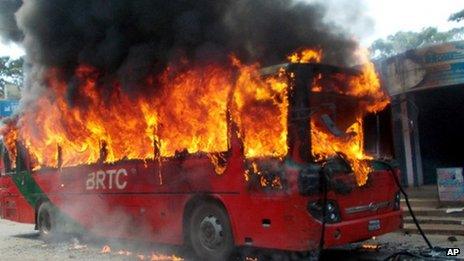
Opposition activists set fire to vehicles in Chittagong and Dhaka soon after Salauddin Quader Chowdhury was sentenced
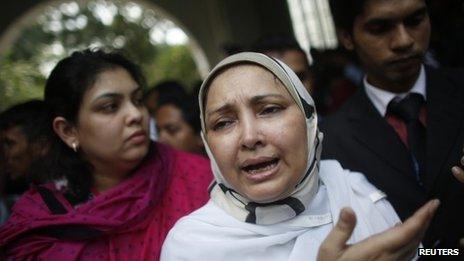
Chowdhury's family - including his wife Farhat Quader Chowdhury - said the life sentence was a politically motivated farce
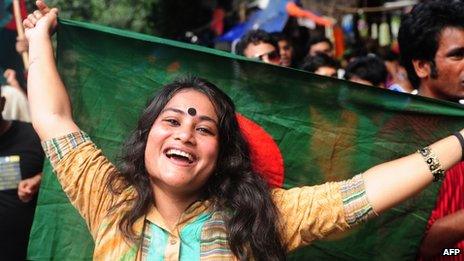
But government supporters and activists welcomed the death sentence as an important milestone in bringing 1971 liberation war crime suspects to justice
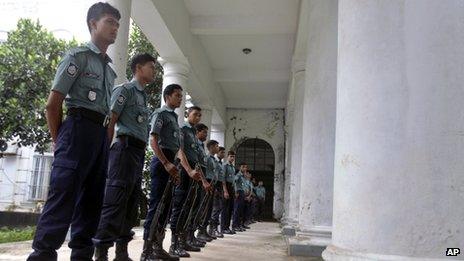
There was a heavy police security operation in advance of Chowdhury's court appearance - the conviction of other war crimes suspects provoked violence
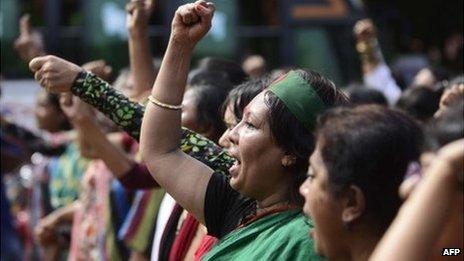
The trial exposed divisions in Bangladeshi society between Islamists and those who value the country's secular traditions
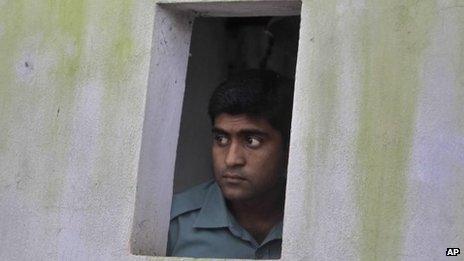
The tribunal has been condemned by international human rights groups for falling short of international judicial standards
The special court was set up in 2010 by the government to deal with those accused of collaborating with Pakistani forces who attempted to stop East Pakistan (as Bangladesh was then) from becoming an independent country.
It has tried nine Jamaat leaders and two members of the BNP - they have always denied any role in war crimes committed by pro-Pakistan militias.
Chowdhury is the first of those BNP members - and the first sitting MP - to be sentenced.
Prosecutors accused him of genocide, abduction, committing atrocities against Hindus and forcefully converting a number of Hindus to Islam.
During the war his father was an influential politician who worked to prevent Bangladesh breaking away. The prosecution also said that his father's residence in Chittagong was turned into a torture cell at that time.
Bangladesh government figures estimate more than three million people were killed during the war. Other researchers put the figure at between 300,000 and 500,000.
- Published4 September 2016
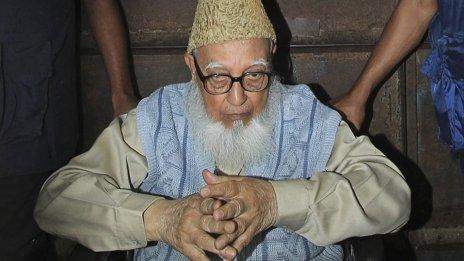
- Published18 September 2013
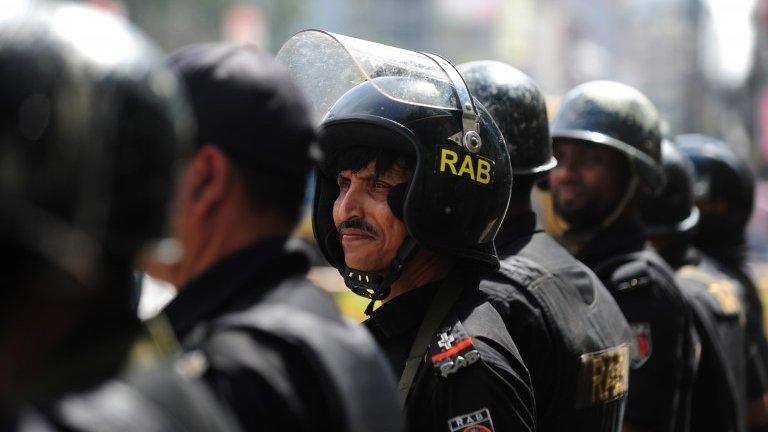
- Published13 December 2011
